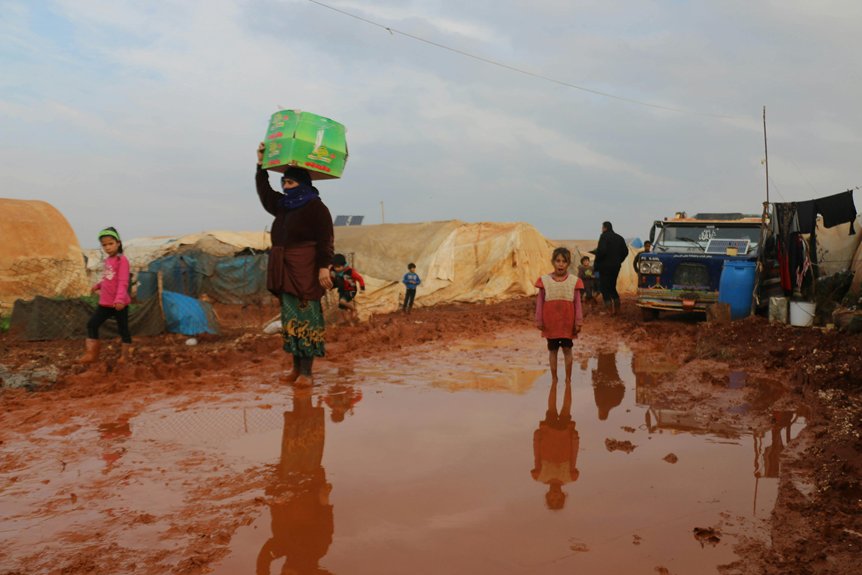
When blackouts or civil unrest strike, being prepared can make all the difference. You need to have a solid urban survival checklist that covers essential supplies, safety strategies, and communication plans. From reliable lighting sources to home security measures, each element plays a vital role in your readiness. Understanding how to navigate these situations can empower you, but there’s more to take into account as you build your preparedness toolkit. Let’s explore what you really need.
Essential Supplies for Blackouts
When the lights go out, being prepared can make all the difference in your comfort and safety. Start by gathering essential supplies that will help you navigate the darkness. A reliable flashlight with extra batteries is vital; you don’t want to fumble around in pitch black.
Candles and waterproof matches should also be part of your kit, providing backup light sources. You’ll need a portable phone charger to stay connected, so pack one with your emergency gear.
Keep a battery-operated radio handy to stay informed about the situation outside. Finally, consider having a multi-tool for various tasks that may arise.
With these supplies, you’ll be ready to face a blackout confidently, ensuring your comfort and safety until power is restored.
Emergency Food and Water Storage
Power outages can disrupt your daily routine, but being prepared with an adequate supply of food and water can help you weather the storm.
Start by storing at least one gallon of water per person per day for at least three days. Rotate your water supply every six months to guarantee it remains fresh.
For food, stock up on non-perishable items like canned goods, dried fruits, and nuts. Aim for a variety of nutrients, including proteins and carbohydrates. Don’t forget a manual can opener!
Consider freeze-dried meals for long-term options. Finally, keep your food and water in a cool, dark place to prolong their shelf life.
Being prepared means you’ll stay nourished and hydrated during emergencies.
First Aid and Medical Supplies
Being prepared for medical emergencies is essential, especially in urban settings where help mightn’t be immediately available.
Start by assembling a well-stocked first aid kit. Include essentials like adhesive bandages, antiseptic wipes, gauze pads, and medical tape. Don’t forget over-the-counter medications for pain relief, allergies, and digestive issues. Consider adding prescription medications you or family members may need.
Learn basic first aid skills, including CPR and how to treat burns or wounds. Having a reliable reference guide can be invaluable.
Also, keep a thermometer and scissors handy. Regularly check and replace expired items in your kit to guarantee everything’s ready when you need it. Being proactive can make a significant difference in emergency situations.
Communication Tools and Strategies
In an emergency, clear communication can be just as important as medical supplies. To stay connected, invest in reliable communication tools. A battery-powered or hand-crank radio can keep you informed about local news and updates.
Consider walkie-talkies for short-range communication with family or neighbors. Don’t rely solely on cell phones; networks may go down during crises. Create a communication plan with loved ones, designating meeting points and check-in times.
Use text messages for non-urgent updates, as they often go through even when calls can’t connect. Lastly, gather important documents and contact information in a waterproof bag for easy access.
Personal Safety and Self-Defense
While you can’t predict when an emergency might occur, preparing for personal safety and self-defense can greatly boost your confidence and security.
Start by familiarizing yourself with self-defense techniques; consider taking a class to learn practical skills. Carry personal safety tools like pepper spray or a whistle, and know how to use them effectively.
Always stay aware of your surroundings—trust your instincts and avoid risky situations. If you feel threatened, seek safe spaces and alert authorities.
Forming a safety network with friends or neighbors can also be beneficial; plan check-ins and share resources.
Home Security Measures
After taking steps to enhance your personal safety, it’s time to turn your attention to securing your home.
Start with solid locks on all doors and windows; consider deadbolts for extra protection. Reinforce entry points by installing security bars or window film.
Utilize motion-sensor lights around your property to deter intruders. Don’t overlook your garage; secure it with a quality lock and consider a smart garage door opener.
A security camera system can provide peace of mind and evidence if needed. Create a neighborhood watch group to keep an eye on each other’s homes.
Finally, keep your valuables hidden and maintain a low profile on social media to avoid attracting unwanted attention. Your home should feel like a fortress, so take these precautions seriously.
Transportation and Evacuation Plans
Having a well-thought-out transportation and evacuation plan is essential for managing emergencies effectively. Start by identifying multiple routes out of your area, considering both main roads and backroads.
Keep your vehicle fueled and in good condition; you never know when you’ll need to leave quickly. Pack an emergency kit that includes water, non-perishable food, and essential documents.
Familiarize yourself with local transportation options, like buses or trains, in case you can’t use your vehicle. Designate a meeting point for family members; guarantee everyone knows how to reach it.
Stay updated on local news for real-time information about road conditions and safe routes. Your preparedness can make all the difference in guaranteeing your safety during an emergency.
Skills to Develop for Urban Survival
To thrive in an urban survival situation, you need a diverse set of skills that can adapt to various challenges.
Start with basic first aid; knowing how to treat injuries can save lives during emergencies. Familiarize yourself with self-defense techniques, giving you the confidence to protect yourself if necessary.
Learn to navigate without a GPS—reading maps and using landmarks can be invaluable. Cooking and food preservation skills will help you make the most of limited resources.
Additionally, practice effective communication; knowing how to relay information clearly can facilitate cooperation with others.
Finally, develop critical thinking and problem-solving abilities. These skills will empower you to assess situations quickly and make informed decisions, ensuring your safety and survival in unpredictable urban environments.
Community Resources and Support Networks
How can you tap into community resources and support networks during an urban survival scenario?
First, connect with local organizations like community centers, food banks, and shelters; they often provide essential services during crises.
Join neighborhood groups or online forums to share information and resources.
Establish relationships with your neighbors; you can create a mutual aid network where everyone helps each other.
Stay informed about local emergency plans and community meetings; they’re great opportunities to learn and engage.
Don’t forget to leverage social media for real-time updates and support.
Finally, consider volunteering; it builds connections and strengthens your community, ensuring you’re not alone when challenges arise.
Building these networks now can make all the difference when you need help later.
Conclusion
By preparing with this urban survival checklist, you’re taking important steps to guarantee your safety during blackouts and civil unrest. Stocking up on essential supplies, establishing communication plans, and enhancing home security can make all the difference. Remember, staying informed and connected with your community is essential. Don’t wait for emergencies to strike—start building your preparedness now, and empower yourself to navigate any situation with confidence and resilience. Your safety is in your hands!






